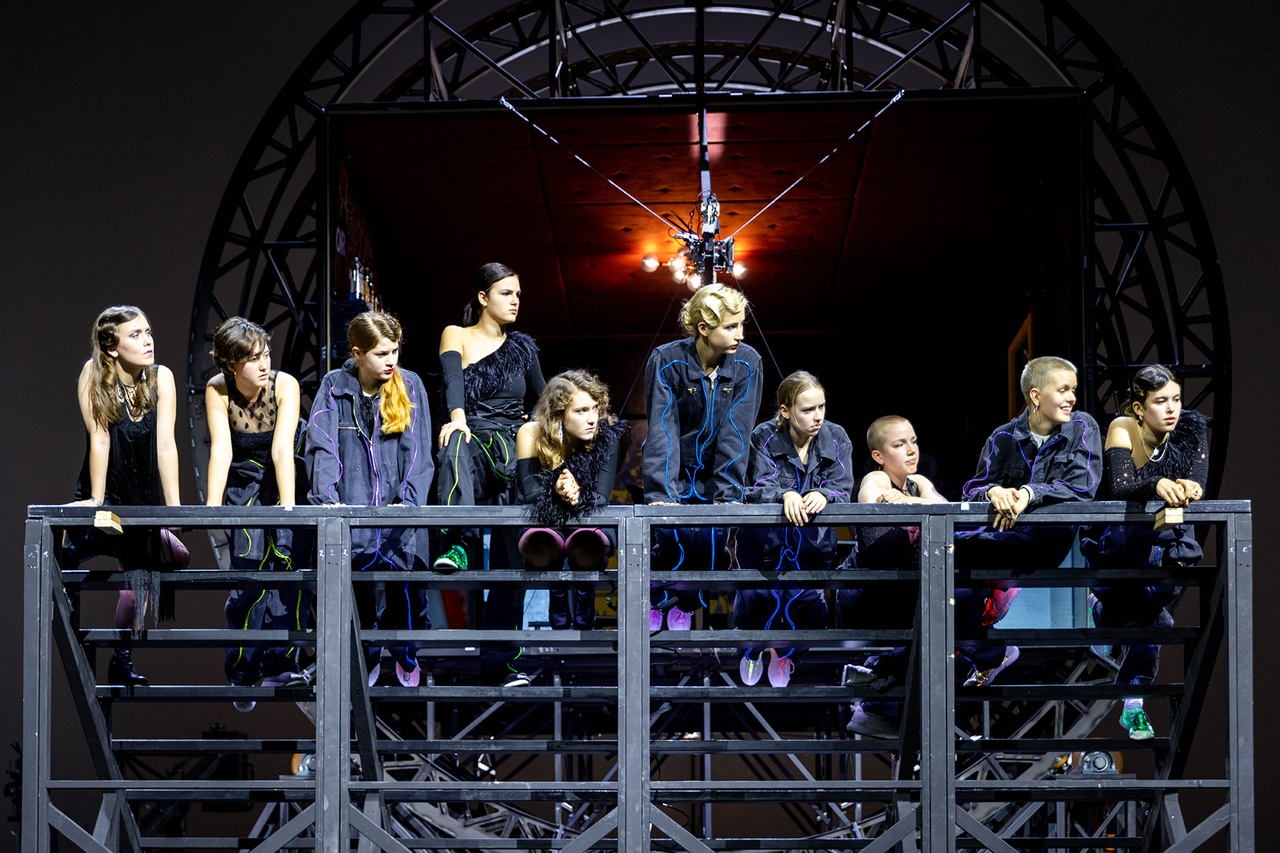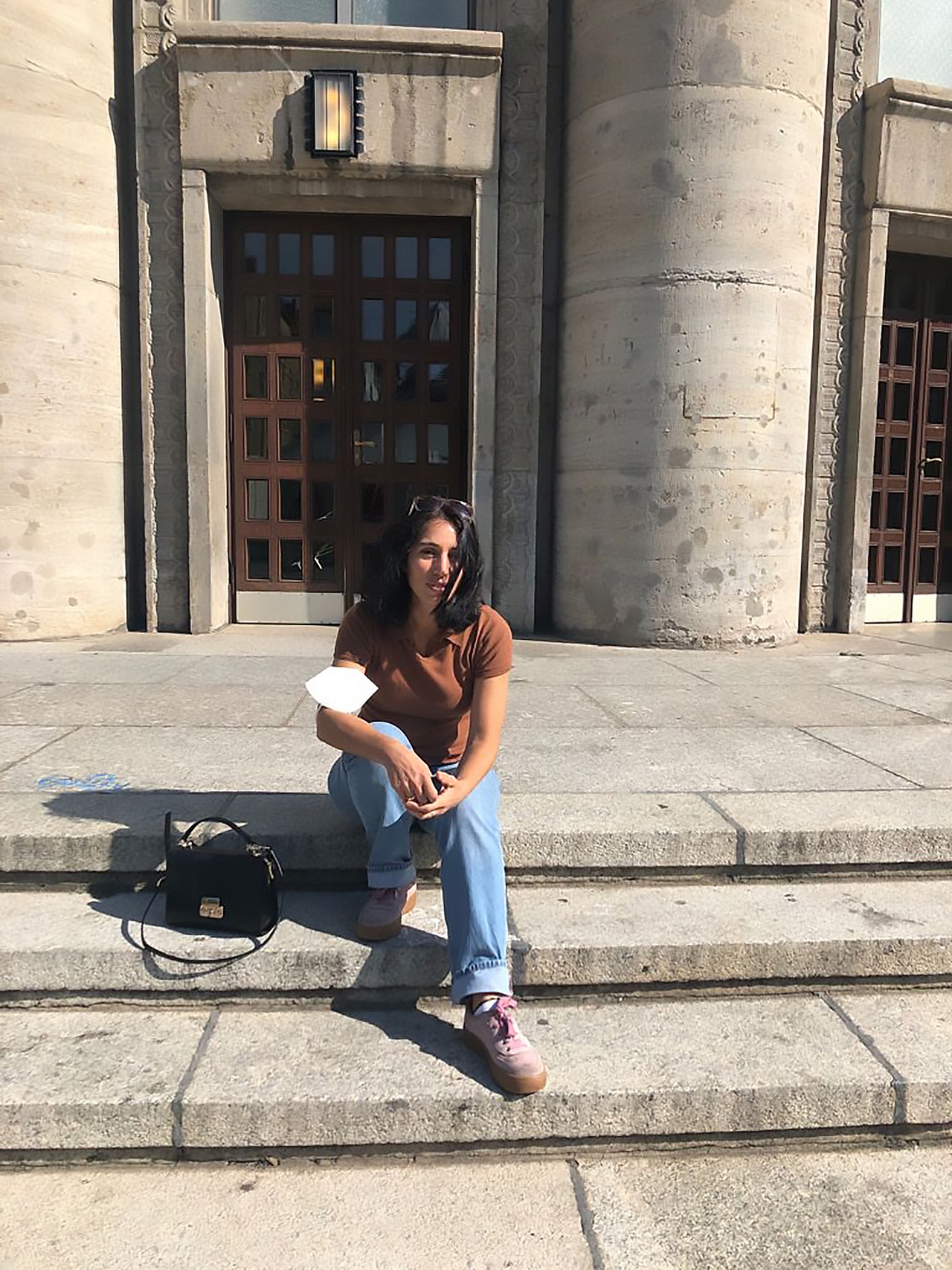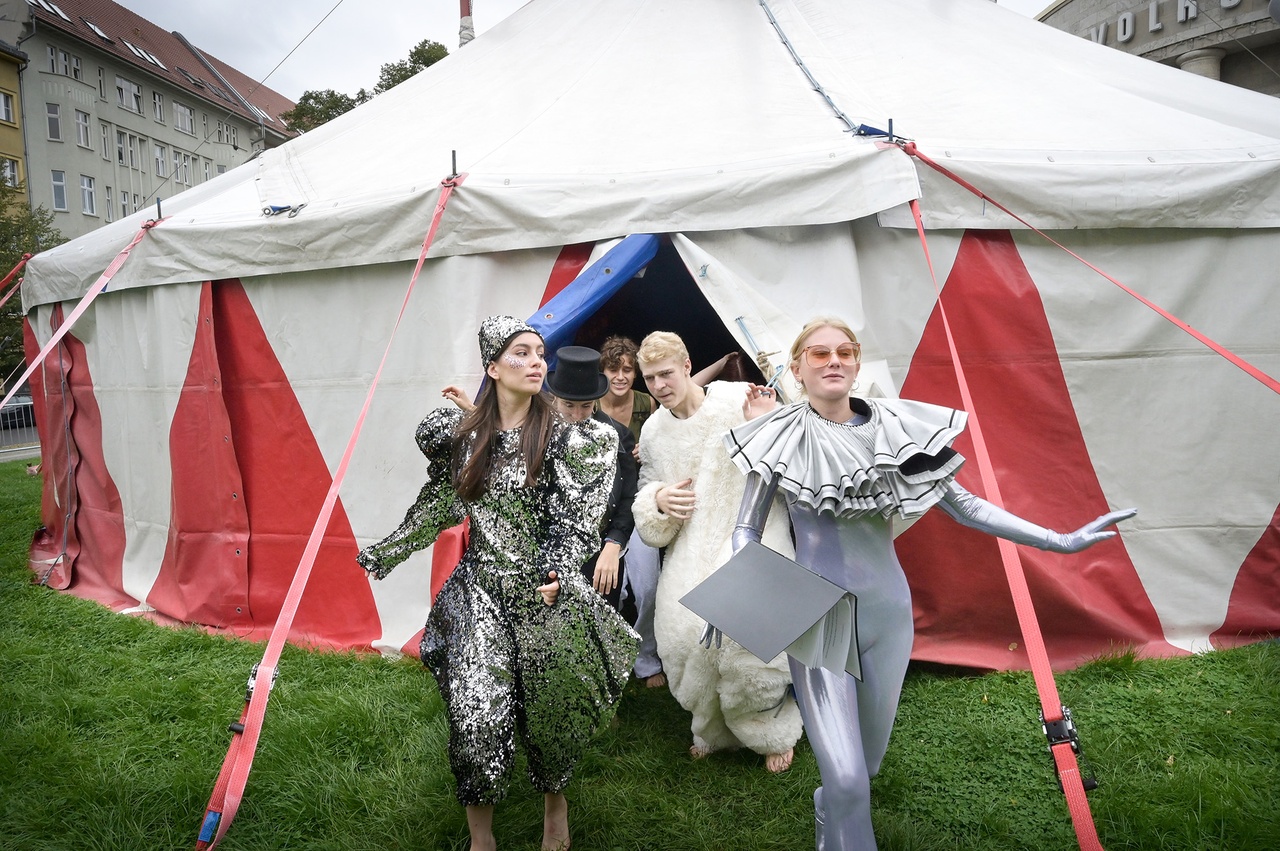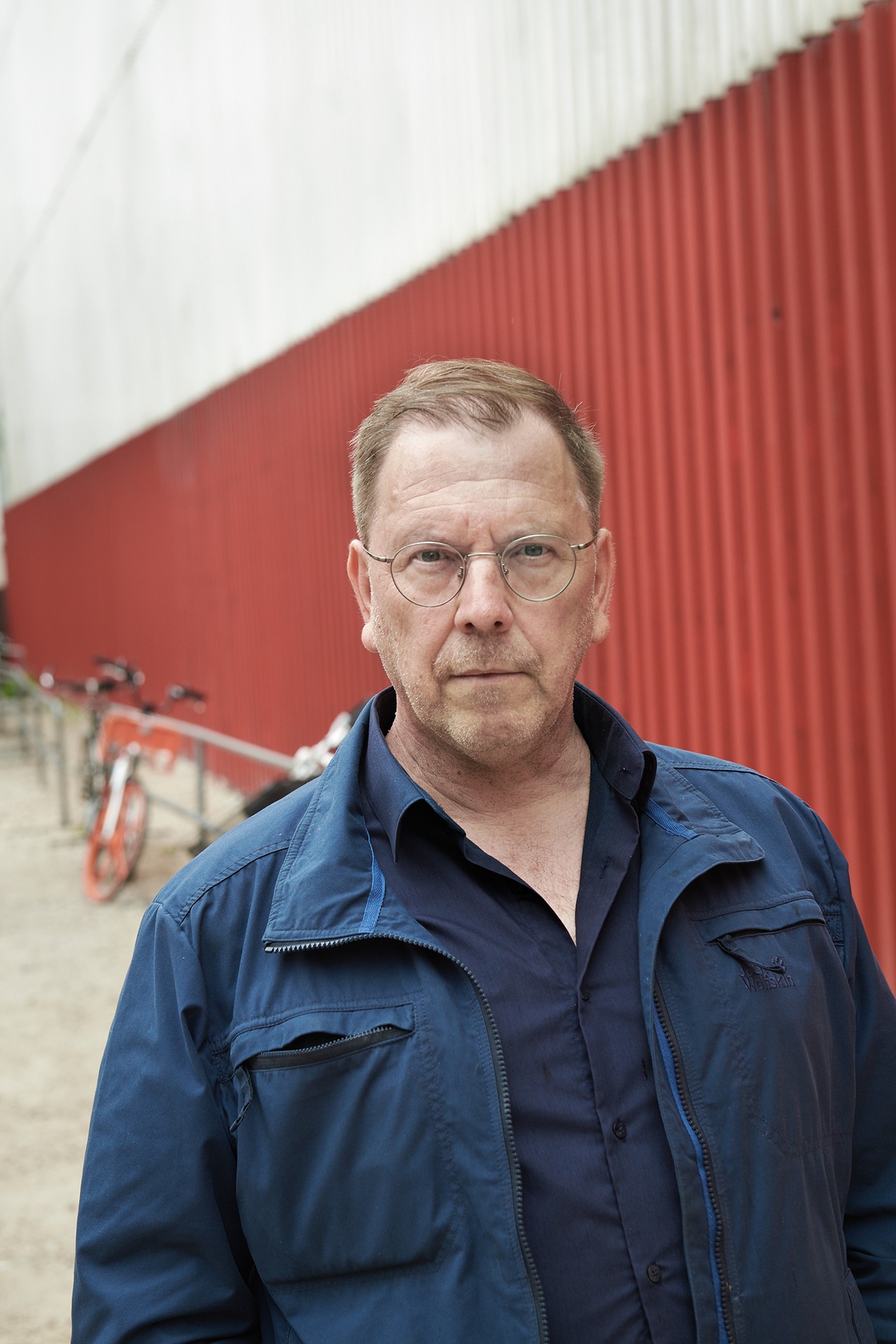AN UNSPOKEN COLLECTIVE A Roundtable with Matthias Dell, Marlene Engel, René Pollesch, and Vanessa Unzalu Troya

„Die Gewehre der Frau Kathrin Angerer“
MATTHIAS DELL: We want to talk about collectivity. What does collectivity mean at the theater in historical terms?
RENÉ POLLESCH: Participatory decision-making.
DELL: Are those one and the same? Or, to put it another way: How does the Volksbühne position itself here and now in relation to the historical collective decision-making models of Berlin’s Schaubühne or at Schauspiel Frankfurt?
MARLENE ENGEL: When it comes to music, we often talk about platforms – the word is used for festivals, for instance, but also for distributors like Spotify and social media like Facebook or mixed forms like YouTube. Suddenly, everything’s a platform. And the question is how exchange can happen on those kinds of platforms. I think the word actually comes from the theater stage, where the stage is the platform. It’s about working collectively onstage and something unplanned happening. And within this unplanned togetherness, you can maybe anticipate something contemporary or of the future. And on this theater stage – this is how I understand René’s work, at least – it’s specifically about the unplanned happening and art being formulated collectively.
POLLESCH: It’s so important that you immediately carry the term over into the theater. It’s also totally illuminating. Everyone relies on not knowing beforehand what will happen, or on no one person having a vision that everyone has to share – instead, it comes from people working together.
ENGEL: Again, it’s different in music. There’s this image of the “independent” musician dating back to the 1980s, at least in electronic, underground music. Music was produced, then there was a label that distributed it, a PR person – all of them were independent, but at the same time there was this assertion of having formulated the whole thing together. “Independent” doesn’t exist in that sense anymore because there aren’t as many labels, and the ones left take on other roles: there are far fewer sales outside the mainstream, so distribution and thus capital is centralized on so-called platforms like Spotify. Musicians have become lone warriors, promoting and distributing their work on these platforms where they have no decision-making rights and rather compete against people who are actually part of the same community. So, you’re independent in the sense of having to play all the roles at the same time. You do your own accounting, your own PR, your own production, everything. The image feeds on its collective history. And that’s something we have to overcome, because this form of independent doesn’t work, either financially or artistically. There’s just not that much power in always formulating only your own position.
POLLESCH: I think it’s good that with this, you’re saying: reclaim platforms! Get back on stage!

Marlene Engel
ENGEL: The term is often used for visual art festivals too, which are platforms you buy your way into and where they show art that sells well. Which is fine for making money, but we shouldn’t delude ourselves about the content. It’s not about collectivity. Some curator stretches a general theme over everything and books a few hip music projects to keep the audience entertained. But it should be the art that formulates the questions.
DELL: But if you look at the concept of the platform as found on the internet, within social media culture, collective decision-making means participation. But that also just means everyone has a Facebook account and they pay with their data. What’s being thought of here as collective used to be called reception. But the Volksbühne’s work is about the production side.
POLLESCH: But that’s how I’ve understood things, too. There’s this term “platform capitalism” – Airbnb and so on. But the term originated on the stage, where specific people collaborate and accept not having any advance knowledge of what’s going to happen.
ENGEL: This self-determination is what makes the difference. On the online platforms, there’s no right of collective decision-making. You just hand over your data, and when something in the company policy changes, you click “agree.” And if you don’t like it, you’re kicked off. That contradicts the collective, where you have the right to contribute your own artistic content without giving up your self-determination.
POLLESCH: One thing that’s hidden in this explanation is that we don’t orient our praxis around a concept like “collectivity.” We’ve actually noticed that if we work another way – so, rather than having a text as the basis, one might start with stage design – that something different happens, that something very good can happen onstage too. So rather than working away at developing a concept of collectivity, one works on a praxis that corresponds with what Marlene just set out in regard to platforms. I’d prefer to say that we are our own platform, the Volksbühne platform. It’s also not that we’re constantly talking about the collective. Sometimes we’ve also said “Volksbühne stakeholders.” But does that mean we’re speaking about collectivity?
VANESSA UNZALU TROYA: No, actually. We’re an unspoken collective!
DELL: To return to internet platforms, there’s the critique that unlike traditional industry, they don’t produce anything. With my car, I play taxi or in my apartment, I play hotel, but the big money ends up at the platforms. Now it’s all about creating value from nothing, but if you think about it in creative or artistic terms, doesn’t this creating-something-out-of-nothing also have a role to play in the theater?

Vanessa Unzalu Troya
POLLESCH: In the Anglo-American world this is about the kind of theater that draws on the imagination of the audience and doesn’t cost a whole lot of money. They still draw on Shakespeare. The prologue in Henry V, for example: you sit in the Globe Theatre, which is actually just a wooden frame, and someone says you have to imagine the fields of Azincourt over here, some horses over there, and a castle over there. It’s still like that in Anglo-American spaces. I was in New York with Bert Neumann once. They don’t have the money for set designers, they don’t even know the job exists. They just have objects or spotlights on the stage. Then a light goes on and they say, here we are at Columbine High School; then a light goes on and they’re at the shooter’s house or something. You’re meant to imagine everything. But that’s not something Bert Neumann cared about at all – he just put something on stage. He didn’t turn up as a blank white page that’s actually filled top to bottom with normative writing. It’s just that imagination has its limits. But the Brits and the Americans always act as if reality came up short. But it’s not reality that comes up short, it’s their budgets. A room onstage is just a window hanging on a few threads, because there’s no money for anything else. The whole thing appeals to the audience’s power of imagination. Which is a total sham: the audience won’t be able to imagine some utopia, they’ll only ever paint it the way it already is.
DELL: That would be the self-exploitation of platform capitalism: people have to use their own imaginations to fill in the gaps left by the budget.
POLLESCH: We don’t do things like that. With us, the set designers build spaces. That’s not something where the fantasy of some audience member gets in the way of things. Thank god. And the actors have to look at things too and ask themselves, what is it that we’re doing here?
DELL: Just to return to historical examples. When a theater is being relaunched, is it significant that there have been these attempts at collective decision-making?
UNZALU TROYA: It’s not something that has played any role in my work. People from P14, the Volksbühne’s youth theater at Rosa-Luxemburg-Platz, arrive with a whole load of ideas about how things should work. And then it breaks down. They call themselves directors and think they need an assistant director, that’s how they learned things. And it falls apart. The platform, the stage, is so intense that they notice, I can’t do this on my own. And suddenly, they need other people. And something comes into being. There’s a lot of people that want to turn up as actors, but during the rehearsals they do something else, things become fluid, people respond to each other differently and come out the other side completely different once the production’s over.
DELL: What makes it all break down?
UNZALU TROYA: A lack of strength. Or the premiere. Or someone suddenly saying, why should I be your assistant when you’re no better than I am? Make your own photocopies! Or they notice, oh, I don’t have the experience, I have to get someone’s help and we’ll try to solve the problem together.
DELL: With young people, isn’t there even less on this blank sheet of paper?
UNZALU TROYA: There’s already quite a lot on that blank sheet of paper. There are very strong ideas about particular roles and hierarchies, but they break down while the work is happening, because it becomes clear that they don’t get you anywhere. And because there are other experiences at P14 that have been passed down.
POLLESCH: My parents didn’t have anything to do with the theater, for example. But they still had an idea of what a director is, what an actor is, that there are people who tell others what to do. That’s something everyone knows. But these ideas just aren’t accurate. Overcoming class society also means overcoming the division of labor, of course, so at P14 there’s some guy who’s been the director, and next time he’ll do the stage design, and the time after that he’ll be one of the actors. No one’s just the one and only.
DELL: And how are decisions made? Theater needs decisions to be stipulated.
POLLESCH: Not every theater lives on stipulations.
UNZALU TROYA: I don’t know about that – there are stipulations made at our theater, and it isn’t always a bad thing either. It makes it possible to cede some of the responsibilities. But self-determination is a part of that.
DELL: Can this process of negotiation be defined more precisely?
UNZALU TROYA: I can think back on a lot of discussions about costume, which is so important because it’s so close to the body. There are a lot of discussions, a lot of negotiation. Whether the idea for the costume design overrides the self-determination of the actors, for example.
POLLESCH: If it suddenly emerges when the normal hierarchies are absent that costume is more heavily discussed than anything else, then I would say it’s the same with our praxis. It’s a massive problem during rehearsals if, while we’re talking about our collaborative plans, a couple of us go off to the side for a quarter of an hour and come back dressed differently, as if we were mannequins. It just doesn’t square up with saying that costume is a central thing. Normally you’d think, ok, costume design isn’t quite as important as dramaturgy, direction, the text, and so on. The costume thing is a sticking point we still haven’t solved: How do you eradicate that? That a few people have to change outfits during a rehearsal? Its not like I have to go somewhere during the rehearsal, take my pants off, put another pair of pants on, and then go back. It obviously significant if, going forward, I don’t have to be a body but the others do. How do you get rid of that problem?
DELL: Are there any ideas?
POLLESCH: I don’t have any yet. I just found it interesting that Vanessa said that costume is a main point of discussion. And that things can only be like that if you have a different kind of praxis.

P14, „(AT) Arbeitstitel sind auch Titel!“
DELL: Let’s look at negotiation again. Feminist critique has always pointed out the power relations at play in discussions, and that the solution is not for those who are always talking anyway to speak long and wide. To prevent this, there are things like mixed speaker lists and time limits, so that the chatterboxes get to the point or at least don’t get to chew everyone’s ear off. Are concepts like those important in the discussions at the Volksbühne?
UNZALU TROYA: We’ve tried, because there were complaints that discussions ended up being limited to just three people and that others weren’t getting a chance to speak. So we made speaker lists, which almost killed us. They’re so inorganic, super stressful. And then the discussion about whether to continue the same way took hours, too. How much sense does it make when I stop my impulse to speak, then wait for my turn to come along again at some point, but the discussion is already somewhere else completely? But then there were people who said, well, that’s how I feel all the time.
DELL: So the experiences have been pretty mixed?
UNZALU TROYA: I hardly set any rules; they always have to be remade, together. Because there are always new people joining, obviously, and I don’t like it when a group closes up – P14 should remain open. I think it’s important for that to be one of the few rules.
ENGEL: In collectives in Vienna, my experiences have tended to be more negative when it comes to a particular kind of grassroots democracy. In large groups, it tends to lead to inertia. There are certain divisions of talent, and in organic terms, that works better than speaker lists. This works because there’s already a feminist mindset. There’s an organic arrangement. It’s fine for some people to be more in the lead, as long as the people in the background are all noticed and seen.
POLLESCH: I agree that it’s very important, this feminist mindset.
ENGEL: With that basis, it can just work. I’m certain that there are enough theaters where it doesn’t work because certain people take up too much space.
DELL: And to nitpick a little about this negotiation project: Who has the final yes or no? If the ones on the stage say to the costume designers, no, I don’t want that, who has the last word?
POLLESCH: The last word? The ones who are going to wear the costume. Like with the text: it’s the ones that will read the text aloud. There are some people who hear when someone makes a suggestion, and the “no” is heard too.
DELL: We were talking about the “organic.” Everyone shares the same mindset, that’s why the discussions work. It doesn’t work without that mindset.
ENGEL: I’d say that people work together because they have a shared understanding. It’s another thing entirely when total strangers are thrown in together. And I don’t want to say that the speaker list idea is wrong either, it’s not about right or wrong. It’s definitely something that makes sense for some people.
DELL: But wouldn’t the political question then be about who communicates that to the outside world? To be blunt, the organic nature of the Volksbühne could also be described like this: our processes are all in order, we have it good, and what happens outside of this space doesn’t matter.

Rene Pollesch
POLLESCH: Right now, audiences are used to theaters making confessions: that’s how we do things now. And there’s this hope that it will be recognized as such. But maybe it would be more exciting to not make a big deal about it. Maybe then someone might be interested in checking it out again.
DELL: But then, how could public image and public relations work? Press conferences are only there to serve the needs of the media. Dieter Kosslick once said at a Berlinale that that year was about “strong women in extreme situations,” which was sexist nonsense; the truth was that in three films, it wasn’t men who had all the dialogue, and one was set in the Arctic or something. But this statement gets reported, and some media start wanting to read the whole program through this one statement.
POLLESCH: Why should we do press conferences like that? I find some achievements, like the stage design being the first author of our events, so important that you have to publicize them. This is something I find important, one reason being to make sure the stage designers don’t get told that René Pollesch got a ship built by Bert Neumann. That’s something that has to be corrected: the stage designers don’t take on an assignment, they give us an assignment.
ENGEL: And maybe we should talk more about weak men in dull situations.
DELL: To go back to internal, organic matters: How does the Volksbühne deal with conflicts?
UNZALU TROYA: We spend a lot of time talking and negotiating. I allow it because it’s important. We had an actress who’s not with P14 anymore but who started there. She’s in Bochum now and calls herself a “non-actress,” in the sense of non-professional, because she always emphasizes the open process of the work, which makes it possible to draw attention to difficulties in developing the event. That’s a pride thing, not wanting to just be professional in the sense of only executing a task – because it’s more important to expose or address things that disturb you or that you don’t want to do.
POLLESCH: On that note, it occurs to me how I’m no use as a director who has a vision, then trains everyone to make it a reality, then says to himself: yep, that’s right, that’s exactly how I wanted it all to be. We get good results because no one clings on to one particular thing – not the costume designer to her costume that nobody wants to wear, nor the author whose texts no one wants to read aloud.
DELL: To come back to the question of how to communicate that to the outside world, look at theater criticism, which comes from outside and says, “So where’s the collective stage production? There are currently just three things by René Pollesch in repertoire.”
POLLESCH: But they are collective productions. And I know that this gets conveyed. When I’m interviewed I publicize our praxis too, and when actors get interviewed they do the same thing. And if that’s something that doesn’t get shown just because we don’t stage it in a rehearsed way, we see that as other people’s problem.
DELL: But for how long is it other people’s problem? In terms of communication, of legibility. One name might have an image associated with it, but collectives were always attempts to circumvent those kinds of market-based categorizations.
POLLESCH: Rimini Protokoll were one of the first collectives to be perceived as such and where one didn’t say of it that too many cooks were spoiling the broth. But the audience did single out Stefan Kaegi a bit: when he’s on board, it’s amazing. These are mechanisms that come from outside, that seek to divide people. It’s like the conflict we got caught up in because Vegard Vinge and Ida Müller didn't come to the Volksbühne as planned. Something like that then gets represented as artists attacking each other. People want the drama, but we’re not in a position to offer it.
DELL: As one last question: A community of stakeholders? A collective?
POLLESCH: ... a platform. Maybe we’re only going to be talking about platforms from now on.
DELL: ... the platform and the money. The money was obviously always an issue in the historic models of collective decision-making. How can that materialize? Does the Volksbühne have uniform salaries or anything like that?
POLLESCH: Not yet.
Translation: Matthew James Scown
Matthias Dell works for Deutschlandradio and writes for Zeit Online about the weekly ARD Sunday evening crime drama series.
Marlene Engel has been musical director at the Volksbühne am Rosa-Luxemburg-Platz since 2021.
René Pollesch has been artistic director of the Berlin Volksbühne am Rosa-Luxemburg-Platz since 2021.
Vanessa Unzalu Troya has been the director of P14, the youth theater of the Volksbühne am Rosa-Luxemburg-Platz, since 2008.
Image credit: 1. Photo: Luna Zscharnt; 2. Photo: Sabine Gudath; 3. Photo: Leonie Jenning; 4. & 5. Photos: Thomas Aurin
